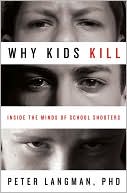

 |

|

The average rating for Why Kids Kill: Inside the Minds of School Shooters based on 2 reviews is 2.5 stars.
Review # 1 was written on 2009-04-21 00:00:00 Sabs Johnson Sabs JohnsonI honestly am not sure where to begin with this book. In books of this nature, the authors too often fall prey to "cherry-picking" their quotes in order to prove whatever points they wish to push. Columbine Shooter Eric Harris left a wealth of essays, journal entries, and other writings, and it's easy to pull out a few "psycho-like" quotes and "prove" that the reason Harris killed was that he's a psychopath. Nice and easy for the world, since that takes everyone off the hook: his parents, his friends, his school, and society in general. If he's a psychopath, than no one is in any way responsible for "creating" him, and isn't that just a comfortable thought? But the fact is, that for every Harris-quote that demonstrates a cold-blooded, unsympathetic killer who only hates and doesn't care about anyone but himself, I can show a quote showing a more complex side. This is a boy who plotted to blow up his school, but he's also a boy who cried when he thought of what his actions would do to his parents. This is a boy who killed humans, but couldn't stand the thought of anyone abusing an animal. This is a boy who listed "compassion" as the trait he thought most valuable - hardly what a psychopath would say. This is a boy who could kill because he thought all of mankind - including himself - were useless, weak, and evil. You have to wonder (if you aren't convinced by the only semi-rational arguments of "experts" such as the author of this book) how Harris' life could have ended differently if someone had paid attention to what was really going wrong in his world. And on the issue of bullying: In the opening chapter of this book, the author states that, contrary to "myth", the shooters were not bullied. He then goes on to clarify that bullying, as he "uses the term" does not mean anything but actual repeated physical violence, accompanied by a real threat to the victim's life. Excuse me? This psychologist is actually redefining bullying? There are many, many established ways a child can be bullied, and physical violence is only one of them. Experts have proven, over and over, the effect name-calling has on children. For example, people are becoming more aware of how girls' lives are ruined by the bullying of other girls; bullying that rarely includes physical violence, yet can lead to suicide by the victims. Throughout the book, this author continually repeats that the shooters were not bullied. It in only in the final chapters, that the author mentions the shooters were "teased". Teased...such a friendly word, compared with "bullied". He says that Eric Harris (who had a chest defect) was "teased in gym class". A couple of pages over, he mentions other shooters being "teased" and states: "If you already feel like a reject and a failure, any experiences that support those feelings will be magnified in your mind. Thus, the issue is not simply that the shooters were sometimes teased or rejected but that they were highly vulnerable, and therefore highly reactive, to these experiences." A few pages over, he had this to say: "Being teased caused the shooters shame and humiliation....they felt the shame of it deeply. In response to this shame, they became full of rage at their peers." Okay, so apparently he does believe that the "teasing" and "rejection" had profound effect on the shooters - even going so far as to implicate it as a cause of the shooters' rage - but he still won't admit it was bullying? This book has some interesting material/ideas in it, but with its biased nature and serious defects, it should not taken as the final "truth" on Columbine or any of the other school shootings. |
Review # 2 was written on 2016-09-01 00:00:00 Bevin Cherot Bevin CherotFascinating insight into the minds of 10 school shooters ranging from 11 to 23 years of age, and 5 potential school shooters that the author has solid reasons to assume he deterred from going on with their plans. The research is sound, the information is, as much as possible, very accurate, and the book doesn't lose itself in speculations about the shooters' lives. The insight of the author - a psychiatrist himself - is very valuable to a criminology/sychology student such as myself, especially through the discussion of preventive behaviours/actions. I thoroughly enjoyed this work and hope to find more, written as cursively as this. |
CAN'T FIND WHAT YOU'RE LOOKING FOR? CLICK HERE!!!